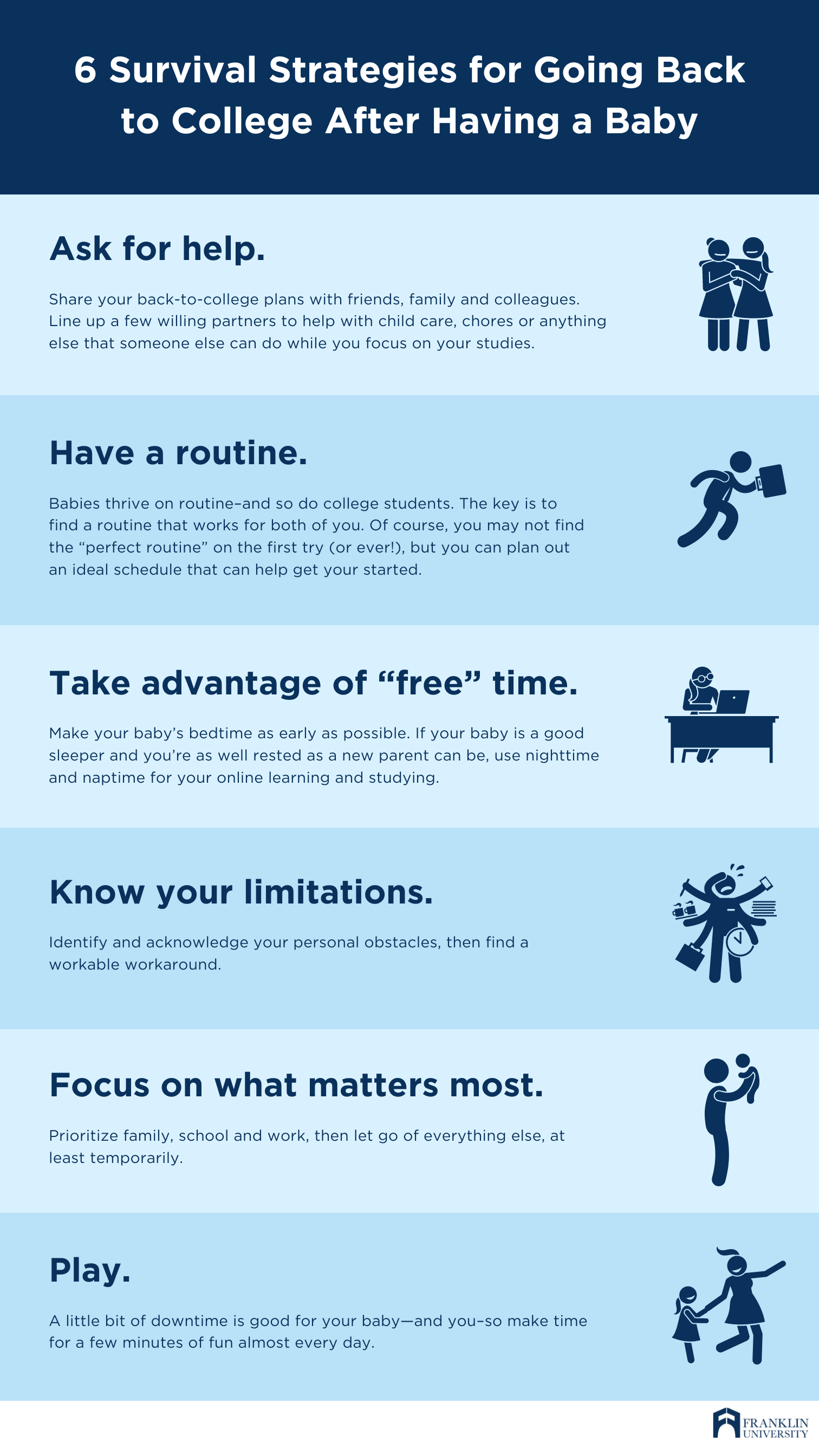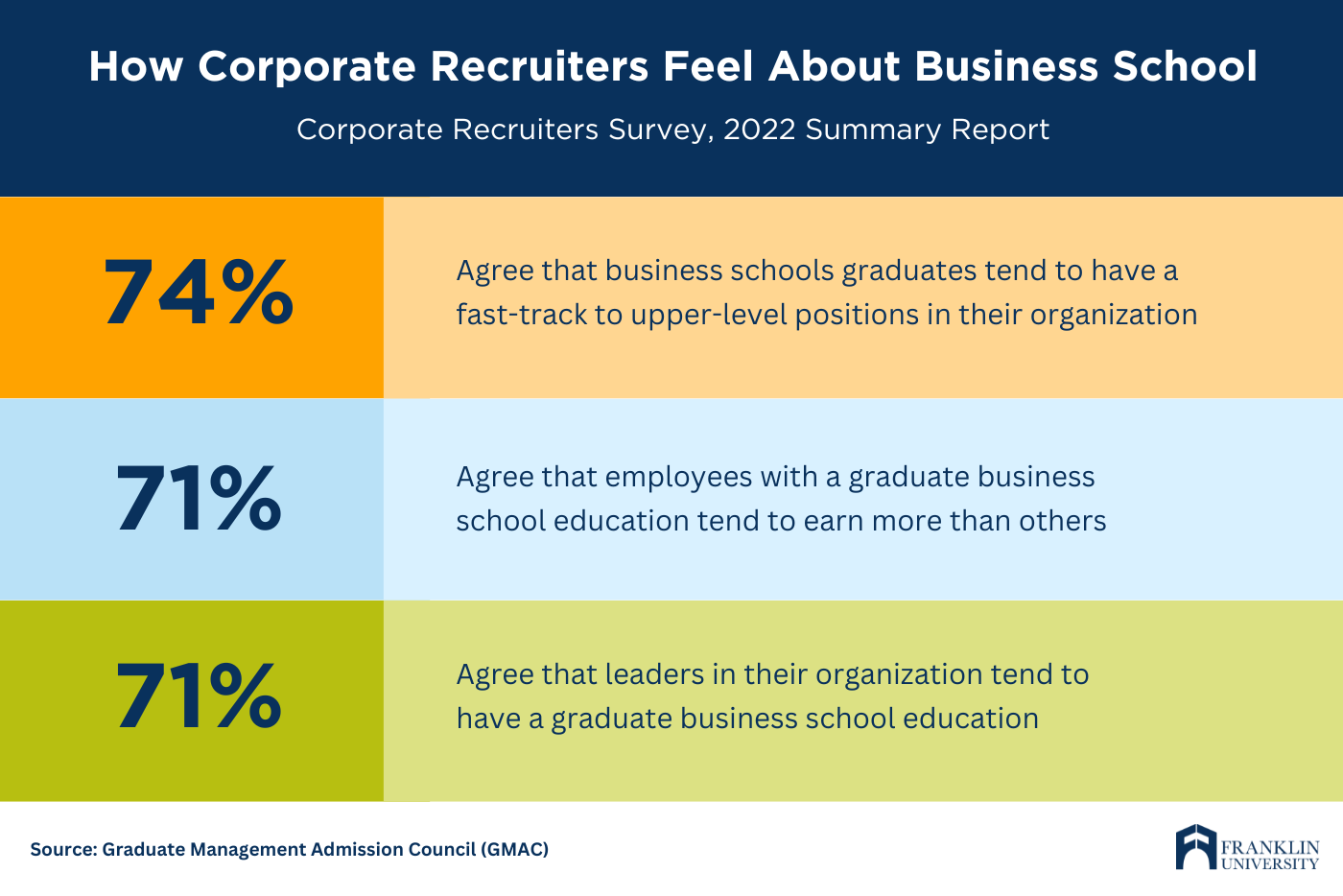Request Information
We're Sorry
There was an unexpected error with the form (your web browser was unable to retrieve some required data from our servers). This kind of error may occur if you have temporarily lost your internet connection. If you're able to verify that your internet connection is stable and the error persists, the Franklin University Help Desk is available to assist you at helpdesk@franklin.edu, 614.947.6682 (local), or 1.866.435.7006 (toll free).
Just a moment while we process your submission.

Does It Matter Where You Get Your MBA? (3 Things to Know)
In a world where everything from potato chips to minor league sports to neighborhoods are ranked, does it matter where you get your MBA?
Yes, it matters–but not for the reasons you may think.
Top-ranked business schools and their MBA (Master of Business Administration) programs make their respective rankings lists for any number of reasons, the least of which is name recognition.
U.S. News, for example, ranks business schools with full-time MBA programs using their own methodology, taking into account post-graduate placement numbers, admissions and quality indicators, as well as a variety of other factors, such as location, culture and financial aid.
The point is, don’t pay too much attention to the rankings. Your employer or future employer likely won’t care about the rankings–but what they do care about is whether you have an MBA.
In fact, according to the Corporate Recruiters Survey 2022 Summary Report from the Graduate Management Admission Council (GMAC):
- 87% of corporate recruiters have high confidence or confidence in business school hires
- 92% of corporate recruiters expect to hire new MBAs
- 95% of staffing firms plan to hire recent MBA grads

In addition, recruiters and hiring managers from all sectors will tell you that it’s not the Harvard or Wharton or Dartmouth MBA that gets you the job. What could help you improve your chances of getting hired or promoted? Choosing a quality, accredited college or university and earning an MBA accredited by IACBE, AACSB or ACBSP. (Well, that, and demonstrating how your MBA-earned skills will bring value to their organization.)
An MBA vs. an Ivy League MBA
There’s a misconception that an MBA from an Ivy League school matters more than any other MBA.
While it is true that Ivy League schools boast an impressive list of MBA alumni, so do other colleges and universities whose MBA degree programs are accredited by an accrediting organization like the International Assembly for Collegiate Business Education (IACBE), the Association to Advance Collegiate Schools of Business (AACSB) and the Accreditation Council for Business Schools and Programs (ACBSP).
Add in the fact that only a small percentage of applicants even make it into an Ivy League MBA program (let alone graduate), and it's easy to see why the only name on an MBA degree that matters is yours.
What matters most when choosing a master’s program? Compare features, benefits and cost to find the right school for you.
What Is Business School Accreditation and Why Does It Matter?
Ivy League or not, when it comes to business school degree programs, some of the best are accredited by one of the top three accreditation bodies: IACBE, AACSB and ACBSP.
Here’s a brief overview of each–and why it should matter before you pick your MBA program.
- The International Accreditation Council for Business Education exists to partner with higher education institutions to recognize excellence in business education. Earning IACBE accreditation means that the program has been vetted for excellence and has demonstrated that it follows best practice in business education.
Bottom line: An IACBE-accredited MBA program helps ensure that you receive a high-quality education from a university that’s not only dedicated to student learning but also to continuous program improvement.
- The Association to Advance Collegiate Schools of Business exists to foster engagement, accelerate innovation, and amplify impact in business education. Earning AACSB accreditation means that the program meets the AACSB’s rigorous standards for faculty and curricula.
Bottom line: An AACSB-accredited MBA program helps ensure that you receive an education rooted in excellence across all aspects: teaching, research, curriculum development and learner success.
- The Accreditation Council for Business Schools and Programs exists to recognize excellence in teaching, learning outcomes, and continuous improvement. Earning ACBSP accreditation means that the program has met the high standards for excellence and has proved that it provides students with the skills employers want.
Bottom line: An ACBSP-accredited MBA program helps ensure that you receive a quality, learning-centered business education.
3 Reasons Why Where You Get Your MBA Doesn’t Matter (and What Does)
1. MBA ROI: Higher Starting Salary
A recent GMAC survey showed that new MBA hires earn a median starting salary of $115,000 a year compared to just $75,000 for those with only a bachelor’s degree. Face it, the potential for higher starting salaries, bonuses averaging $10,500 annually, comprehensive compensation packages, and being more competitively positioned for promotions are all really good reasons to consider earning an MBA.
According to the Education Data Initiative, the average cost of an MBA degree is $62,500. Of course, the cost depends on where you get your MBA. And while there is no guarantee you’ll start out with a six-figure salary, the knowledge you gain by earning your MBA can put you on a path toward higher earnings potential.
Do the math and it’s easy to see that the return on investment of an MBA could be less than your first year of employment after graduation.
2. MBA Opportunities: More Job Functions
There’s no evidence that an Ivy League MBA degree is a guarantee of tons of money and success beyond your wildest dreams. There is, however, clear and convincing proof that the global business world needs more MBAs than Harvard and friends can deliver.
More importantly, when it comes to MBA hires and promotions, what employers want, says the GMAC survey, are MBA graduates who “have strong communication skills, have a versatile skill set, and are strategic thinkers.”
With the skills and knowledge of an MBA, you could position yourself for a wide variety of job functions, including:
- Strategy/innovation
- General management
- Consulting
- Marketing
- Project management
- Product management
- Operations/logistics/supply chain management
- Business development/sales
- Client/customer relationship management
- HR/organizational management
- Market research
Finance - Research and development
- Communications
- Business intelligence/analytics
- Accounting
- Information technology/MIS
- Data science
- Budget analyst
Source: Corporate Recruiters Survey, 2022 Summary Report - Graduate Management Admission Council
Finally, while the broad nature of an MBA can make you an asset in any industry, some MBAs provide the opportunity to customize your studies based on your career ambition.
For example, Franklin University offers a general MBA as well as seven specialization options, including:
- Business Analytics: Become a data-driven leader and drive business success in the new frontier.
- Business Psychology: Develop transformative leadership skills to support innovation and creativity.
- Finance: Hone your decision-making skills to accelerate growth and maximize value.
- Human Resources: Optimize the workplace through people- and performance-focused leadership.
- Marketing: Enhance your ability to reach stakeholders, influence behavior and inspire action.
- Operational Excellence: Learn to lead more effectively and efficiently to boost competitive advantages.
- Organizational Leadership: Define your leadership philosophy and refine your ability to drive change.
The point is, with the right online MBA degree program, you can align your studies with your purpose and passions.
3. MBA Experience: Personal and Professional Growth
Ask anyone who’s graduated with an MBA and most will tell you that earning their master’s in business administration was key to making a difference in their career and their lives, despite not having an Ivy League name or logo on their diploma.
In general, professionals who are 5, 10 or even 20 years out from graduating with an MBA say that an MBA degree from a reputable business school was worth the time, money and hard work it took to earn. In fact, many MBAs say that the longer it’s been since they finished their MBA, the more value they ascribe to it.
As for what prospective employers think, they, too, agree that an MBA is worth it in terms of leadership growth opportunities. In fact, according to the GMAC survey, recruiters agree that employees with a business school education are more likely to fast-track it to upper-level positions (74%) and earn a higher salary (71%). Plus, 7 out of 10 (71%) say their own organizational leaders are more likely to have a graduate-level business school education.

Another reason to earn an MBA, say graduates, is the peer network that comes out of having course-related discussions with fellow MBA students. They say that having a collaborative, real-world classroom environment that lets them interact with students of all ages and backgrounds adds depth of understanding to important business concepts. An added bonus? The right MBA program for you can help you develop a lifelong personal and professional network, featuring trusted advisors and friends from all over the world.
Does Anyone Care Where You Get Your MBA?
Finally, there’s this: Adult students say that standing out in their field and in an ever-changing job market comes not from the so-called hallowed halls of any Ivy League university, but from investing in themselves and their future by earning their MBA.
So, yes, for many, an MBA is worth it, as long it’s earned from a high-quality, accredited college or university.
Ready to earn an MBA on your terms? Learn more about Franklin University’s FlexFIT MBA here.





